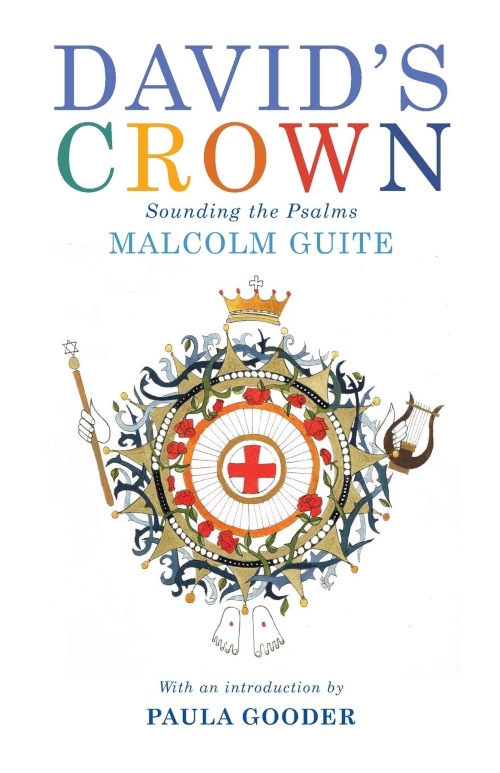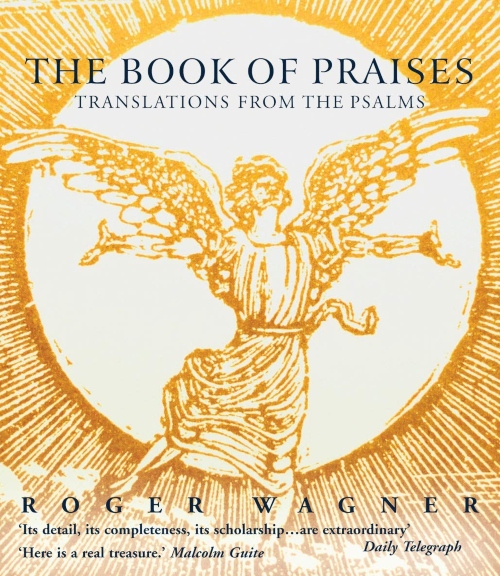Lockdown views of the Psalms
Two people, producing two very different types of art, exploring the Psalms: reviews of Malcolm Guite's David’s Crown and Roger Wagner's The Book of Praises

David’s Crown - Sounding the Psalms
By Malcolm Guite
Canterbury Press Norwich
ISBN: 978-1786223067
The Book of Praises - Translations from the Psalms
By Roger Wagner
Canterbury Press Norwich
ISBN: 978-1786222848
Reviewed By Terry Young
I don’t know what lockdown has done for your Bible reading but it has forced me to revisit my Bible and prayer life, including spending time in the Psalms and discovering how much lovely material there is to support our study.
Two new resources have emerged as lockdown projects, each making a distinct contribution towards reflective worship, although they do so in opposite ways.
 Malcolm Guite reduces each Psalm to an identical format – five, three-line verses – while Roger customises each, embroidering his own translations with engravings and oils, around which English and Hebrew words dance from either side of the page. Both artists realise that we need to slow down in order to embrace the Psalms in all their depth and diversity, and each has used this project as a way of doing so personally throughout lockdown, while offering us a a similar opportunity.
Malcolm Guite reduces each Psalm to an identical format – five, three-line verses – while Roger customises each, embroidering his own translations with engravings and oils, around which English and Hebrew words dance from either side of the page. Both artists realise that we need to slow down in order to embrace the Psalms in all their depth and diversity, and each has used this project as a way of doing so personally throughout lockdown, while offering us a a similar opportunity.
The two projects are not entirely independent, and you can watch Roger and Malcolm discussing their approaches with a third artist, Makoto Fujimura, discussing their various takes on Psalm 22 on YouTube (in part 1 and part 2). Makoto’s aim was against portability and he has created art that was deliberately too big to go into a car, so I’m reporting on the other two projects, available in paper or as e-books.
Taking them in alphabetical order, David’s Crown is a set of 150 poems. As a Christian, Malcom is free to see and describe Jesus in the Psalms, and the crown is a play on words: coronavirus is, literally, the ‘crown virus’, while Jesus wore a crown of thorns and now sits in coronation splendour. Malcolm weaves these ideas together by using the last line from one reflection to start the next, coming back to the start, as with the woven thorns, by using the last line from his reflection on Psalm 150, to start him off with Psalm 1.
What he leaves us with is a deeply uncomfortable sense of glory. If you are going to tackle every psalm, you have to face up to those you struggle with, including, for Malcolm, those demanding vengeance, as in Psalm 83. Whether you find the same psalms disquieting in the same way and for the same reasons is less important than the fact that he has forced you to stand with him in the middle of such pain.
It’s not all about the pain, and the themes of comfort, trust, redemption and glory, provide a rounded and robust coherence, brightening, as does the psalter into unbroken praise by the end.
I did exactly what you’re not supposed to do and read it in one sitting to see what he had done with my favourites and to sense the flow of the whole. When I did that, I was drawn in by the consistency of his structure, mesmerised, even. It was a bit like reading two or three Shakespearean comedies on the trot (but without the corny jokes) where you look up after a while, and think, maybe I could get into all this a bit more.
Roger has taken a completely different path, seeking visual, instead of rhythmic, impact as a way in. He is still playing with words and has produced his own translations from a third, maybe half the psalms from the first three books of the psalter (Psalms 1-89). A later publication will presumably complete the project.
Many will know Roger better as an artist, and he uses his own art – principally wood etchings and oil-on-board paintings – to anchor his treatment of each psalm, splashing his translations around them as he works down the page. Because Hebrew and English work from opposite sides, he is able to play them around his artwork in a highly original manner.
Again, themes that clash with us – deep discomfort and glory – are present in the final production where bright and dark come together at different levels. Roger’s Hebrew, for instance is reproduced in gold, while the English is in black. Meanwhile left-hand pages usually contain dark blue prints while those on the right are usually in gold. The two-tone approach is broken up by some oils that add to the palette.
As part of my Lenten studies, I had joined a group that used art as the centre point for each of six meditations. The group was led by an art historian, and his last piece was Roger Wagner’s Menorah, which depicted the crucifixion in front of Didcot Power Station. This so intrigued me, that I ordered The Book of Praises to find out more about the artist’s faith. I lay down on the couch to read it through as soon as it was delivered the next day, and e-mailed the author to find out more. I don’t think you’re supposed to do either of those things at home.
Clearly, as I write this on Good Friday, I’m still speeding up to slow down. Two people, producing two very different types of art, have filled my head with sticky new images around Easter and the Psalms.
There are lots of ways in which either book could be used constructively in private and at church. I’ve shared my experience with each and am sure I am only just getting started. I commend them to you in hopes that you will also find refreshment in reflection.
Professor Terry Young is an author and member of a Baptist church. He set up Datchet Consulting which combines his experience in industry and academia
Baptist Times, 14/04/2021